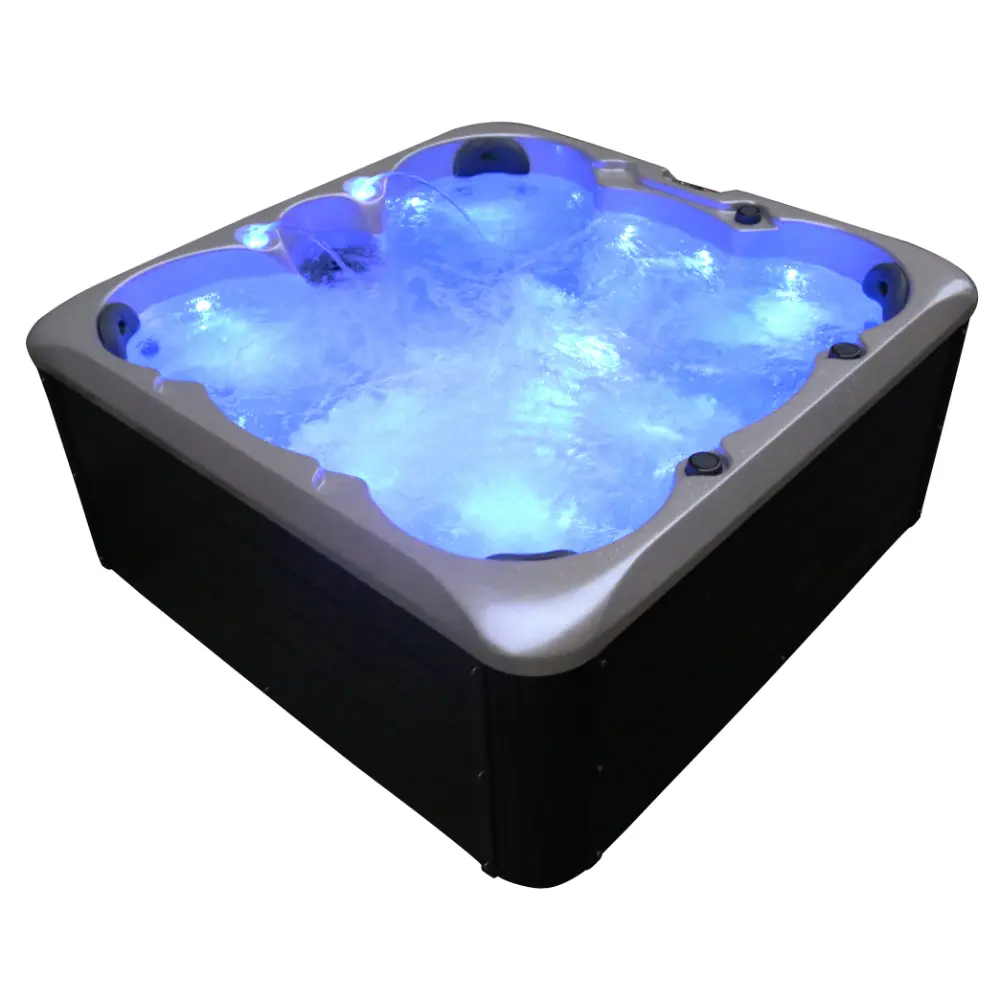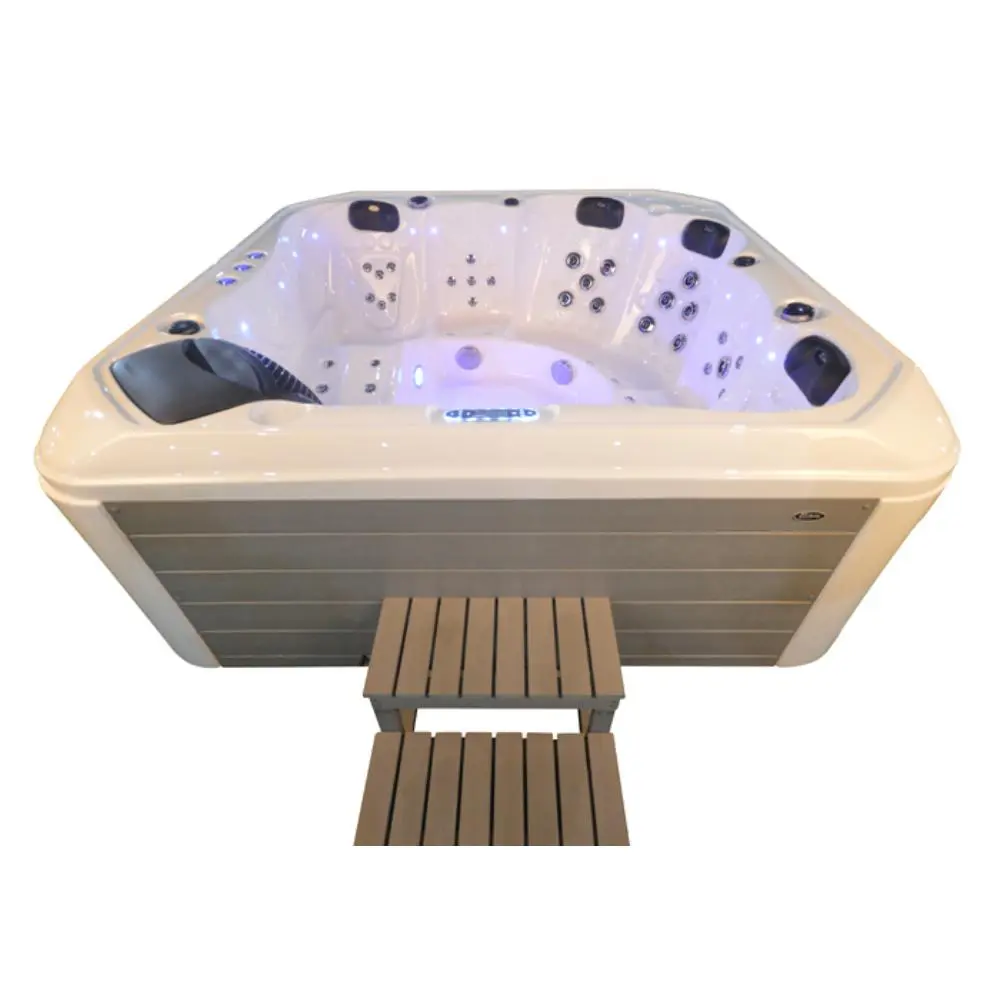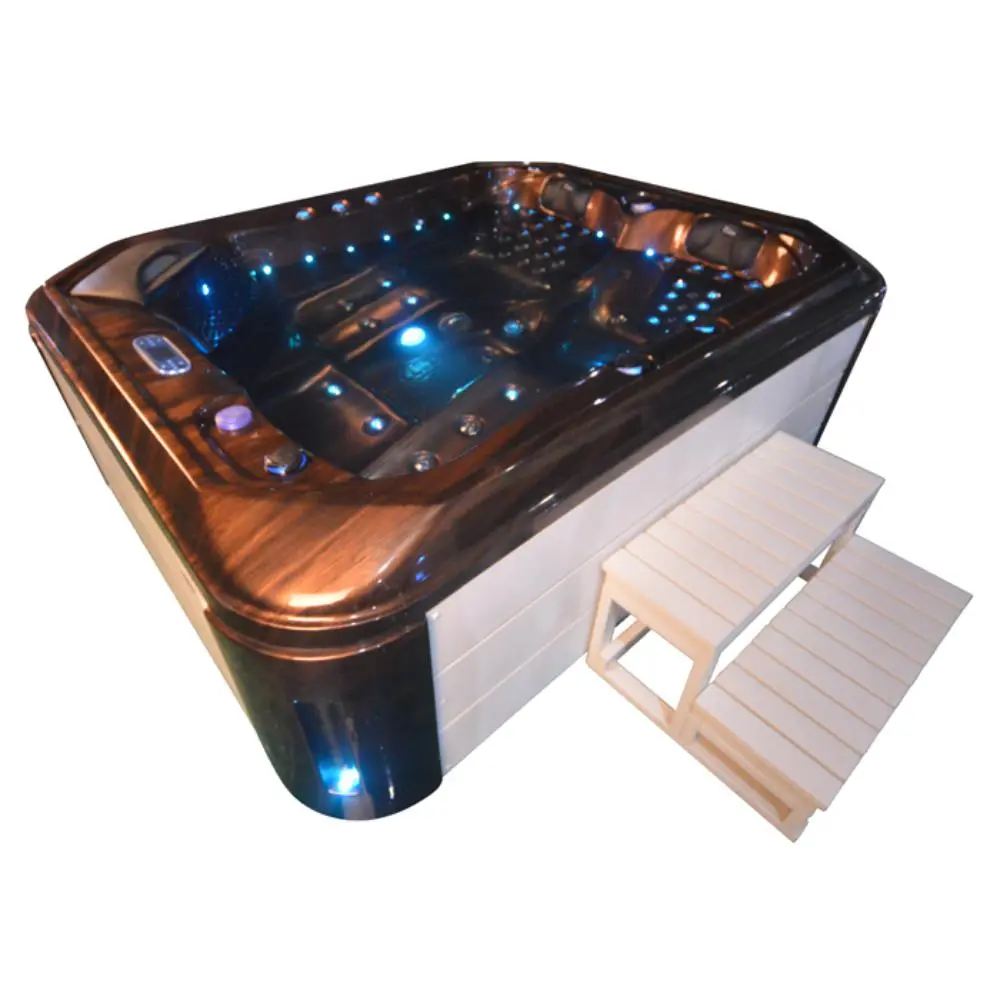Hot tubs have become more than just a luxury; they are now an essential part of wellness routines for millions of people worldwide. Whether you’re soaking for relaxation, improving circulation, or enhancing your sleep, hot tubs provide significant physical and mental health benefits. In this comprehensive guide, we’ll dive deep into the therapeutic benefits of hot tubs and explore how they can help with stress relief, muscle recovery, and better sleep.
If you’re a business owner in the wellness industry looking to purchase hot tubs in bulk, Veritasolus offers a wide range of high-quality spa solutions. Visit Veritasolus to explore bulk order options for your commercial needs.
1. Introduction: The Healing Power of Hot Tubs
The hot tub, with its soothing water and therapeutic jets, has become a cornerstone in many wellness routines. But what makes them so special? Hot tubs combine hydrotherapy (the use of water for pain relief and treatment) with the relaxation benefits of warm water to offer a variety of therapeutic effects. For B2B buyers, hot tubs represent a great opportunity to expand your product offering in spas, wellness centers, and even private homes. They are particularly appealing for businesses looking to enhance their wellness packages for both individual and group relaxation.
Therapeutic Benefits of Hot Tubs
- Stress Relief: One of the most immediate benefits of soaking in a hot tub is stress relief. The warm water and pressure from the jets help to relax muscles, reduce tension, and promote overall calmness.
- Muscle Recovery: Heat therapy from the hot tub helps to improve blood circulation, providing relief for sore muscles and aiding faster recovery post-exercise.
- Better Sleep: Soaking in a hot tub before bed helps regulate your body temperature, signaling to your body that it’s time to relax and sleep.
With these benefits, hot tubs are perfect for both personal and business wellness routines. Now, let’s dive deeper into how hot tubs help with stress relief, muscle recovery, and sleep.
2. What Are the Stress-Relief Benefits of Hot Tubs?
Hydrotherapy for Stress Relief
Hydrotherapy has been used for thousands of years to treat various ailments, but its benefits for stress relief have been well-documented. The soothing heat of the water combined with the gentle massage of the jets encourages relaxation and reduces muscle tension. When you immerse your body in hot water, your blood vessels dilate, increasing blood flow, which helps flush out stress-inducing toxins and promotes overall relaxation.
How Hot Tubs Reduce Stress:
- Decreased Cortisol Levels: Regular use of a hot tub has been shown to reduce the levels of cortisol, a stress hormone, in the body.
- Endorphin Boost: The heat stimulates the release of endorphins, the body’s natural “feel-good” hormones, enhancing mood and providing relief from daily stress.
- Relaxing Massage: The jets in the hot tub provide a gentle massage that targets pressure points, helping to release tension and stress from the neck, shoulders, and back.
This makes hot tubs an ideal addition to any wellness facility. Business owners can find products like massage bathtub manufacturers-H620 and massage bathtub suppliers-HS160 to incorporate into their commercial offerings.

3. How Hot Tubs Aid Muscle Recovery
Soothing Sore Muscles
Hot tubs provide significant benefits for muscle recovery after workouts or physical activities. The warm water increases blood flow to muscles, which helps to deliver oxygen and nutrients that promote healing and reduce muscle soreness. The buoyancy effect of the water also helps to take the pressure off the joints, reducing pain and discomfort.
How Hot Tubs Enhance Muscle Recovery:
- Improved Circulation: The heat helps dilate blood vessels, which increases circulation and speeds up the removal of metabolic waste products that cause muscle soreness.
- Buoyancy Relief: The water supports your body, relieving pressure on your joints and muscles, which makes it easier to relax and heal.
- Jet Therapy: Hot tubs equipped with jets provide a gentle massaging effect that can help relieve deep-seated muscle tension, especially in the back, legs, and neck.
For businesses, offering hot tubs as part of a muscle recovery package can attract customers in need of physical therapy or post-workout relaxation. Professional Bathroom Equipment Manufacturer | Sauna Room, Outdoor Spa, Swimming Spa, Steam Shower Room – Your Export Expert Unlocking Global Markets provide products that can cater to both individuals and group use in spas.
4. The Impact of Hot Tubs on Sleep Improvement
Regulating Body Temperature for Better Sleep
Taking a warm bath before bed is a well-known remedy for improving sleep quality. Hot tubs offer the same benefits, helping your body relax and prepare for restful sleep. By raising your body temperature in the hot tub, you promote a natural cooling process once you step out, signaling your body that it’s time to rest.
How Hot Tubs Help Improve Sleep:
- Relaxation and Sleep Readiness: Warm water helps your muscles relax, reducing any physical tension that may interfere with falling asleep.
- Body Temperature Regulation: The cooling effect of your body after a hot soak signals to your brain that it’s time to wind down and go to sleep.
- Mental Unwinding: The relaxation induced by a hot tub soak helps calm your mind, reducing anxiety and promoting a sense of tranquility before bed.
By incorporating hot tubs into your wellness offerings, you can provide your clients with a natural remedy for insomnia and sleep disturbances. Additionally, businesses can use products like outdoor spa exporters-E620 to complement sleep improvement therapies.

5. How Long Should You Soak in a Hot Tub for Optimal Benefits?
Recommended Soaking Time
To reap the maximum benefits from a hot tub, it’s important to soak for the right amount of time. Generally, a hot tub session lasts between 15 and 30 minutes. However, this can vary depending on your personal comfort and the temperature of the water.
Best Practices for Hot Tub Use:
- Start with 10-15 Minutes: If you’re new to hot tubbing, start with shorter sessions and gradually increase the time as you become more accustomed to the heat.
- Maximum Soak Time: For most individuals, 20-30 minutes is enough for a relaxing soak without overexposure to the heat, which can lead to dehydration or dizziness.
- Stay Hydrated: Make sure to drink plenty of water before, during, and after your soak to avoid dehydration.
6. Can Hot Tubs Help with Chronic Conditions?
Hot Tubs for Chronic Pain Relief
For individuals with chronic conditions such as arthritis, fibromyalgia, and chronic back pain, hot tubs can be incredibly beneficial. The heat helps alleviate pain by increasing circulation, relaxing muscles, and reducing joint stiffness. Hot tubs are especially helpful when combined with other therapeutic treatments, such as gentle stretching or massage therapy.
How Hot Tubs Help with Chronic Pain:
- Improved Blood Flow: Heat helps to relax blood vessels, increasing blood flow and delivering nutrients that promote healing and reduce pain.
- Support for Joints: The buoyancy of water reduces the weight placed on the joints, providing relief for those with arthritis or joint pain.
- Relaxation: Soaking in warm water eases muscle tension and reduces the severity of muscle spasms.
Businesses can consider offering hot tubs as part of pain management or rehabilitation programs. Partnering with massage bathtub suppliers-HS160 or massage spa exporters-H101 can provide clients with customized therapeutic products for pain relief.

7. What Temperature Is Best for Hot Tub Therapy?
Optimal Hot Tub Temperature for Health Benefits
Temperature plays a crucial role in how well hot tubs work for relaxation, muscle recovery, and sleep improvement. Generally, the water should be heated to a temperature between 100°F and 104°F (37°C and 40°C). This range is warm enough to promote relaxation, but not so hot that it risks overheating the body.
Temperature Guidelines:
- For Relaxation and Stress Relief: Aim for a temperature between 100°F and 102°F for a gentle soak that promotes overall relaxation.
- For Muscle Recovery: Higher temperatures, around 102°F to 104°F, can help increase circulation and relieve sore muscles.
- For Sleep Improvement: Cooler temperatures, around 98°F to 100°F, are best if you’re using the hot tub as a sleep aid before bed.
8. Safety Tips for Hot Tub Use
Hydration and Time Limits
Hot tubs are safe when used correctly, but there are a few things to keep in mind to ensure safety during your soak. Staying hydrated, limiting soak times, and listening to your body are key.
Safety Tips for Hot Tub Use:
- Stay Hydrated: Drink water before, during, and after your soak to prevent dehydration.
- Limit Your Soak Time: Aim for 15-20 minutes per session, especially if you’re new to hot tubbing.
- Listen to Your Body: If you feel dizzy, overheated, or uncomfortable, exit the hot tub immediately.
- Avoid Alcohol: Consuming alcohol before or during hot tub use can increase the risk of overheating and dehydration.
9. How to Combine Hot Tub Use with Other Therapies for Maximum Benefits
Aromatherapy, Meditation, and Music
Enhance your hot tub experience by incorporating aromatherapy, meditation, and soothing music. Essential oils like lavender or eucalyptus can add calming scents, while calming music can set the mood for relaxation.
Therapies to Enhance Your Hot Tub Session:
- Aromatherapy: Use a diffuser to disperse essential oils such as lavender, chamomile, or eucalyptus into the air for added relaxation and stress relief.
- Meditation: Practicing mindfulness or guided meditation while soaking in the hot tub can enhance mental clarity and emotional well-being.
- Music Therapy: Soft instrumental or nature sounds can further deepen the relaxation experience, making it easier to unwind and focus on self-care.
10. Incorporating Hot Tubs into Your Wellness Business
How Hot Tubs Can Elevate Your Wellness Offerings
For businesses in the wellness and hospitality industries, offering hot tubs as part of your service can provide a unique selling point that attracts clients seeking relaxation and therapeutic benefits. Whether you’re a spa owner, gym operator, or luxury hotel manager, incorporating hot tubs into your offerings can help you create a more comprehensive wellness package.
Benefits for Businesses:
- Customer Attraction: Hot tubs are a popular feature in wellness facilities, attracting clients who want a complete relaxation experience.
- Diversified Services: Add hot tubs to your spa, gym, or resort services to cater to clients who want more than just massages or fitness equipment.
- Increased Revenue: Hot tubs can provide additional income by offering specialized packages, like hydrotherapy sessions or post-workout recovery programs.
For business owners, partnering with reliable massage bathtub manufacturers-H620 , massage bathtub suppliers-HS160 , or outdoor spa exporters-E620 ensures that you have high-quality equipment that is durable and effective for your clients’ needs.

Conclusion: Making the Most of Your Hot Tub
Incorporating a hot tub into your daily routine offers a wide array of health benefits, including stress relief, muscle recovery, improved sleep, and enhanced relaxation. The benefits extend beyond individual wellness, with businesses also able to offer clients a luxury experience that promotes both physical and mental health.
To get the most out of your hot tub, make sure to follow safety guidelines, optimize the water temperature for your needs, and integrate complementary therapies like aromatherapy or soothing music. Whether you’re a homeowner looking to invest in a hot tub or a business seeking to upgrade your wellness offerings, Veritasolus provides high-quality products, including massage bathtub wholesalers and massage spa exporters, to enhance your hot tub experience.
Takeaway Points:
- Hot tubs offer significant therapeutic benefits for relaxation, muscle recovery, and sleep improvement.
- Proper use, temperature control, and complementary therapies can maximize your hot tub experience.
- For businesses, investing in high-quality hot tubs and related accessories can elevate your wellness offerings and attract more clients.
Explore Veritasolus for premium hot tubs and wellness solutions that cater to both individual and business needs.
Frequently Asked Questions (FAQs)
Can I use a hot tub every day?
Yes, you can use a hot tub daily, but it’s essential to follow safety guidelines, stay hydrated, and limit the time spent in the tub to prevent overheating and dehydration.
How do I clean and maintain my hot tub?
Regular maintenance is crucial. Clean your filters every 4-6 weeks, change the water every 3-4 months, and ensure the jets and surfaces are cleaned with appropriate hot tub cleaning products.
What temperature should my hot tub be?
The ideal temperature for most hot tub users is between 100°F and 104°F (37°C to 40°C). For relaxation and stress relief, 100°F to 102°F is recommended, while higher temperatures are better for muscle recovery.
Can hot tubs help with chronic pain or injuries?
Yes, hot tubs are an excellent tool for pain management. The heat increases blood flow, soothes sore muscles, and helps reduce inflammation, which is beneficial for individuals with chronic pain or injuries.
For more information on purchasing and using hot tubs, or for business inquiries about bulk orders, visit www.veritasolus.com.
